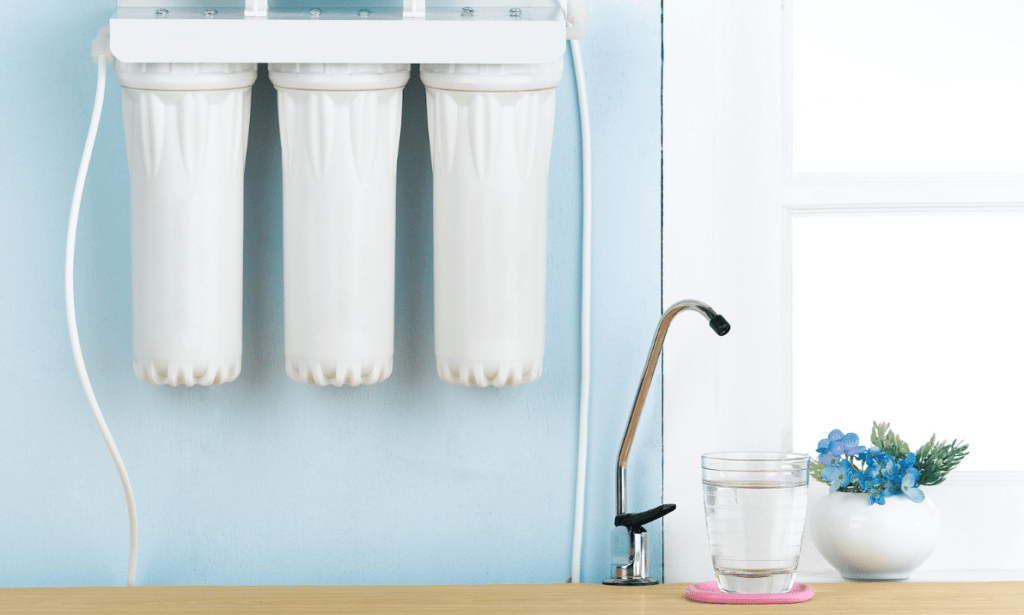Do you live in an area of the country where farming is common? If so, it’s quite likely that your water source contains pesticides that may be damaging your health. A whole house water filter can protect you from pesticides in your water. Bathing in water containing pesticides can result in cancer. For some reason people living in agricultural areas for the most part are not taking precautions against drinking the pesticides they are applying to their crops.
Chlorpyrifos is a pesticide that’s been in use in the United Sates since introduced by Dow Chemical in 1965. Its use has been widespread, from lawns to golf courses to crops.
“The effects of the insecticide on animals and humans has been widely studied since the 1970s. According to the studies, chlorpyrifos affects living things to various degrees: It’s very toxic to birds and insects, including bees, quite toxic to fish, and moderately toxic to humans. However, more recent studies of small children have found a link between chlorpyrifos and lower IQ and developmental problems,” according to the Pesticide Action Network.
Atrazine and Simazine are pesticides also used on crops. Atrazine has been called the most common contaminant present in drinking water. It has been shown to affect hormone production in study participants. Most of these were men. There are many ways to come in contact with atrazine but one of those is in your shower. Bathing in atrazine or drinking it can lead to the development of serious health issues.
A frog born in water containing only 1 part per billion (ppb) of atrazine will grow up having both male and female sex organs. While that does not translate directly to humans, it is known that atrazine affects hormone production and the reproductive system in humans as well as frogs.
Glyphosphate, aka Round Up, Dicamba, or Dalapon, is used extensively to grow corn and beans and sold for household use. There is much controversy around the potential as a cause of cancer in humans. USEPA currently states that glyphosphate does not cause cancer in humans, though it can create a number of other health problems. European regulators have a different view and have largely banned Round Up. For some reason American regulators have not found the same associations with health problems.
Another group of chemicals that is used in farming and currently not regulated are called Nematicides. At this writing there are nine nematicides in use on farm fields that are also commonly found in all Midwestern rivers. Because these pesticides are not regulated you will not find them in your local water quality report. However if your water source is a river and there is farming upstream of where you live you can assume nematicides are present. At this time there is not enough information to know what the health impacts of this group of chemicals is causing in humans.
One chemical you will find in your local water report is nitrate. If you see nitrates in your report then you know that farm chemicals are influencing your water. Unregulated pesticides will also be present. USEPA allows up to 10 parts per million (ppm) of nitrate in drinking water. Yet nitrate levels of 5 ppm have been associated with bladder cancer in post-menopausal women. Unlike pesticides, nitrates cannot be removed by a whole house water filter consisting of carbon. It can be removed using an ion exchange resin or reverse osmosis at the kitchen sink.
There are definite links between exposure to pesticides and a variety of cancers. Still, testing has been limited and pesticides continue to be broadly applied to fields for farming. While there are many benefits to crop production there are extreme costs to human health. These pesticides are washed into local streams and rivers during a rain. Those are water sources for people living downstream.
There are two things you can do to protect yourself. First, buy locally grown organic produce. This will send an economic signal to the marketplace encouraging organic products, meaning produce grown without pesticides. These will cost you more but will not kill you. The second thing you can do is to buy and install a whole house water filter. This will capture any pesticides in the water before you’re exposed.
Some consumers rely on a kitchen water filter to prevent drinking pesticides. This is certainly better than no filter at all. But a whole house water filter will provide you with much better protection. When looking for either filter be sure to invest wisely. Don’t buy the cheap filters that most consumers fall for. The filter pitchers or the small filters that attach to your faucet don’t have enough carbon to effectively remove the contaminants in your water.



